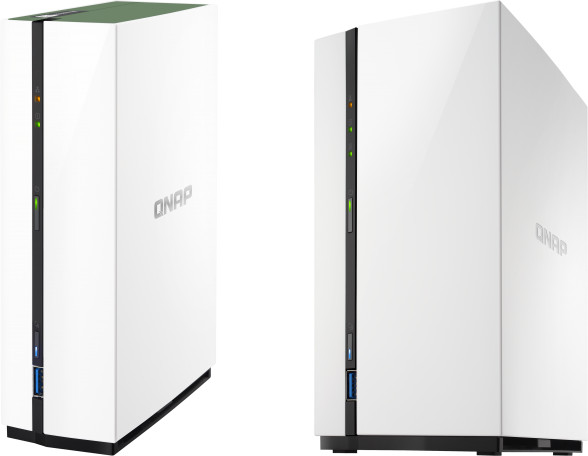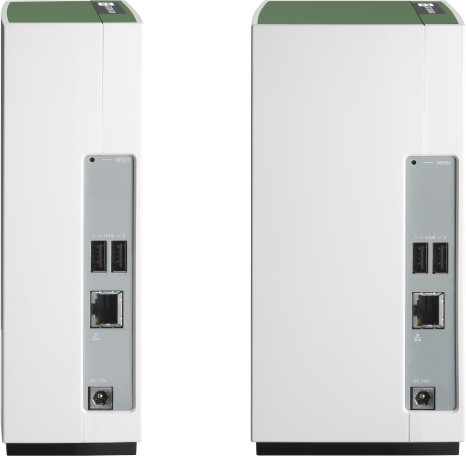Realtek RTD1295 can be found in mid range to high-end 4K TV boxes that often include a SATA bay or interface, as well as an HDMI input port that supports PVR, PiP, and UDP broadcasting, with the devices normally running both Android and OpenWrt simultaneously respectively for multimedia apps, and storage/network functions.
But last year, we also spotted QNAP & Synology working on entry-level NAS based on the processor, and the former has now launched the TS-x28A series with two models: TS-128A & TS-228A equipped with respectively one and two 3.5″ SATA bays.

QNAP TS-128A & TS-228A specifications:
- SoC – Realtek RTD1295 quad-core Arm Cortex A53 processor @ up to 1.4GHz with hardware encryption acceleration engine
- System Memory – 1GB DDR4 (soldered)
- Storage
- 4GB eMMC flash for firmware
- Drive Bay
- TS-128A – 1x 3.5″ SATA 6Gbps
- TS-228A – 2x 3.5″ SATA 6Gbps
- Connectivity – Gigabit Ethernet Port (RJ45)
- USB – 1x USB 3.1 Gen1 port ; 2x USB 2.0 port
- Misc
- LEDs – Network, Disk(s), system status, one-touch copy
- Power, reset, USB one touch copy buttons
- Buzzer for system warning
- 4 x 4 cm cooling blower (fan) for system
- Power Supply
- TS-128A – 36 W, AC 100 to 240 V
- TS-228A – 65 W, AC 100 to 240 V
- Power Consumption
- TS-128A – HDD standby: 2.9 W; In operation: 7.06 W (with 1TB disk installed)
- TS-228A – HDD standby: 5.14 W; In operation: 12.21 W (with 2x 1TB disks installed)
- Dimensions & Weight
- TS-128A – 187.7 x 60 x 125 mm | 560 grams
- TS-228A – 187.7 x 90 x 125 mm | 700 grams
- Operating Temperature & Relative Humidity – 0 to 40C, 5 to 95%, non-condensing, wet bulb temperature: 27C
- Sound Level
- TS-128A – 15.7 dB (A)
- TS-228A – 17.0 dB (A)
The network access storage devices run QTS 4.3.4 (embedded Linux) with support for power management features, storage management (RAID, storage pools, snapshots…), networking, and more as you’ll find out in the side-by-side comparison of the two versions on QNAP website.
Both models are said to be available now, but they don’t show up on many stores yet. We still have some pricing info with QNAP TS-128A sold for around $150 on Snap.com, and TS-228A going for a little over $190 in the same shop.
Thanks to Theguyuk for the tip.

Jean-Luc started CNX Software in 2010 as a part-time endeavor, before quitting his job as a software engineering manager, and starting to write daily news, and reviews full time later in 2011.
Support CNX Software! Donate via cryptocurrencies, become a Patron on Patreon, or purchase goods on Amazon or Aliexpress






https://www.cvedetails.com/vulnerability-list/vendor_id-10080/Qnap.html
There’s been a 4-bay Synology with 2GB RAM out for some time with this SoC, and also there’s a newer 2-bay Synology with 1GB RAM too…
@tkaiser
Just for info, comments with links only have a higher probably of being marked as spam…
But yes, we can see a long list of vulnerabilities. The question is “are other systems more secure, or is it pretty much the same for all devices?”
If I clicked on the details, it looks like most vulnerabilities listed there have been fixed, as long as firmware gets updated.
Odd thing comes to mind, a little Googling and sztomato.com do a OEM box
Model No.: HDMI in and SATA Box
CPU: Realtek RTD1295 Quad-Core ARM Cortex-A53 64-bit @2GHz
GPU: ARM-T820
Memory: DDR4: 2GB (Option: 1GB)
Flash: eMMC: 16GB (Option: 8GB)
Bluetooth: BT4.0
OS: Android 6.0 Marshmallow
Not sure if Sata in or outside the box. No idea of price and there is the problem of software.
Just a random thought.
@theguyuk
Yeah, there are many RTD1295 boxes. Shenzhen Tomato contacted me about that one, but I did not write about it since it looked to be exactly the same hardware (and likely software) as Xnano X5 that had been covered here previously.
Yes you beat me to reply 🙂
Bit more digging and cnx-software has already covered the box. Look up Xano X5 on cnx-software.
Xnano X5 4K TV Box with Gigabit Ethernet, HDMI Input, USB 3.0, and SATA Goes for $68 and Up
Well, QNAP is not that horrible like eg. WD http://gulftech.org/advisories/WDMyCloud%20Multiple%20Vulnerabilities/125 (anyone using any of these WD MyCloud thingies who did not already update the firmware should immediately disconnect these thingies from the network!) but it’s common practice amongst those commercial NAS vendors shipping software that can be easily exploited even remotely.
Obviously open source software is coded differently: https://www.cvedetails.com/vendor/14129/Openmediavault.html
@cnxsoft
QNAP used to be terrible at sorting out vulnerabilities, but recently they became one of the CVE Numbering Authority companies and actively submit (and I hope solve) issues.
https://www.qnap.com/en-us/news/2017/qnap-named-cve-numbering-authority-cna-making-every-effort-to-provide-optimal-data-protection
That’s where you get more options by using devices supported in mainline. I bought a Synology DS116 ~18 months ago because it’s built around an armada385 which is 100% supported in mainline, and I removed all their junk to use non-crippled kernel, rsync and filesystems instead. This results in a pretty functional backup server allowing me not to depend on broken software anymore.
RTD1295’s introduction in mainline came around 4.13 and still seems young, it still doesn’t seem fully supported yet, so that limits your options to get away from possibly vulnerable or simply unreliable software.
And Andreas who did the work mentioned that RealTek doesn’t want us to replace vendor firmwares anyway: https://www.cnx-software.com/2017/09/27/banana-pi-bpi-w2-is-a-features-packed-realtek-rtd1296-development-board/#comment-546529
I wonder if that’s the QNAP first spotted here (bottom of article): https://www.cnx-software.com/2017/06/07/realtek-rtd1296-stbmedia-nas-soc-coming-soon-with-dual-ethernet-dual-sata-hdmi-2-0-input-and-output/
And I take it RTD1295 is 28nm?